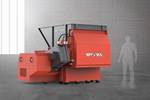Additives: Slip Additive Masterbatch for LDPE Film
Dow Performance Silicone’s new MB25-235 masterbatch said to significantly reduce COF and provide long-term performance.
A new silicone-based slip additive masterbatch for LDPE film that reportedly optimizes form-fill-seal (FFS) flexible packaging production, has been launched by Dow Performance Silicones, a global business unit of DowDuPont Specialties Products division. Dow Corning MB25-235 masterbatch is said to significantly reduce the coefficient of friction (COF) for LDPE film. The product is said to address the traditional drawbacks of organic additives by delivering stable, long-lasting slip performance and avoiding migration to the film surface.
MB25-235 is based on advanced silicone slip technology that helps to boost production speed, maintain uninterrupted throughput and ensure uniform film quality. This masterbatch is said to surpass the performance of traditional organic additives by delivering a consistently low, stable COF that is unaffected by time duration or temperature. It reportedly meets the film’s critical mechanical properties like tensile and tear strength.
Unlike organics, it will not migrate to the film surface. Moreover, it’s cost effective as it only needs to be incorporated into the outer (skin) layer of multilayer films, reducing the amount required; it is effective at low loadings of 2-4wt%. Approved for food contact under FDA, EU and Chinese regulations, MB25-235 is well suited for use in food and non-food packaging using FFS technology. The product joins the company’s 2017 launch of Dow Corning HMB-6301 masterbatch for reducing COF in BOPP film.
Related Content
-
Resin Prices Still Dropping
This downward trajectory is expected to continue, primarily due to slowed demand, lower feedstock costs and adequate-to-ample supplies.
-
Melt Flow Rate Testing–Part 1
Though often criticized, MFR is a very good gauge of the relative average molecular weight of the polymer. Since molecular weight (MW) is the driving force behind performance in polymers, it turns out to be a very useful number.
-
The Fundamentals of Polyethylene – Part 2: Density and Molecular Weight
PE properties can be adjusted either by changing the molecular weight or by altering the density. While this increases the possible combinations of properties, it also requires that the specification for the material be precise.












